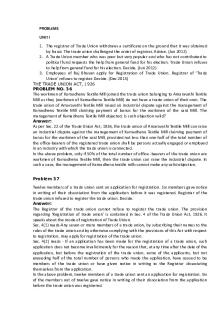CSR Apple Labour Issues PDF

| Title | CSR Apple Labour Issues |
|---|---|
| Course | International Corporate Social Responsibility |
| Institution | City University of Hong Kong |
| Pages | 4 |
| File Size | 233 KB |
| File Type | |
| Total Downloads | 61 |
| Total Views | 133 |
Summary
Lecture notes need for exam...
Description
CSR: Apple Labour Issues of Subcontractors For each iPhone 4 it sold, a margin of 71.7% - Massive demand for iPhones - Apple forces low margins on its supplier - This has led suppliers to compete with each other by forcing excessive overtime on workers - Some of them engage in unsafe production practices, and employing underage workers - Profits is considered as more important than elimination of workplace abuses. Foxconn Suicides From 2019 to 2010, a total of 13 workers had committed suicide. The first worker, Sun Danyong, committed suicide after he had been interrogated on the loss of an iPhone 4 prototype that had been found in his possession.
Why did they commit suicide? Zhu Guangbing - organiser of investigation of Foxconn said “The facilities of Foxconn are fine, but the management is poor” Audrey Tsui, professor at NUS Business School said Foxconn maintains a military-style management approach
CSR Issues 1. Labour and Human Rights Issue Monotonous Work and Military-Style Management ● Workers were not allowed to interact with each other ● Workers who violated the rule were penalised with a fine
● Long Working Hours ● Up to 70 hours per week ● 10 hours above the maximum hours set by Apple’s Supplier Code ● Employees did not have any time to enjoy and relax
2. Child Labour Issue In Febuary 2011, the media reported that the child labour issues has worsened at the suppliers of iPods and iPhones Apple’s Supplier Responsibility Report 2011 revealed 91 underage workers (under 16 years old) and children were employed at 11 factories involved in making its products. They also found cases of juveniles being used to lift heavy goods, workers having their wages docked as a punishment and one factory dumping waste oil in the toilets.
Apple’s Current CSR practice: “The Supplier Code of Conduct” ● ●
Outlines Apple’s expectations for the suppliers it does business with As a condition of doing business with Apple, suppliers have to commit to the Supplier Code 1. The Electronics Industry Code of Conduct (EICC) Guidelines and standards for the electronics sector 2. The final assembly manufacturers are audited every year and the componentsuppliers are audited arbitrarily
Apple’s Four-Stage Process for Auditing Facilities 1. Audit Prioritisation Risk-based approach Geographic risk, commodity risk, planned spending and previous audit performance Look at the concerns from NGOs, internal apple team, and anonymous complaint 2. Onsite Audit Interview workers, review payroll documents, inspect the work conditions Facility is graded on more than 500 data points corresponding to the Code of Conduct Find out the violations 3. Addressing Issue Noncompliant suppliers must submit a Corrective Action Plan within 2 weeks Working with suppliers and checking in different intervals (30/60/90 days) 4. Verifying Improvement Assign third-party auditors to the facility after 120 days Schedule a second verification within 30 days if the standards are not reached Apple’s Current Practice on Labour & Human Rights Limiting working hours ● Less than 60 hours per week with a mandatory rest day ● Achieve 97% compliance across all workweeks, average full-time working hours is 55 hours per week ● Work-hour tracking tool and weekly reports to make changes with suppliers more quickly Apple’s Current Practice in Staying Clear of Child Labour Refuse any underage labour ● Force supplier to return the children to home and pay for education and basic income until the children reach the legal working age ● Enlist third-party to monitor children’s progress ● Supplier must re-employ the children “Suppliers shall employ only workers who are at least 15 years of age or the applicable minimum legal age whichever is higher” - Apple’s Code of Conducts
Secretive Practices and Lack of Transparency Apple ranks as the 15th lease transparent company among the 105 most valuable multinational corporations ● The factory campuses do not allow the public to enter ● Factory workers are required to sign confidentiality agreements...
Similar Free PDFs

CSR Apple Labour Issues
- 4 Pages

Apple CSR Outline
- 2 Pages

CSR - csr
- 4 Pages

Apple
- 11 Pages

Labour Costing
- 1 Pages

Labour-ACT2003
- 58 Pages

makalah CSR
- 1 Pages

Labour Laws
- 148 Pages

Contoh proposal csr
- 6 Pages

PROPOSAL PERMOHONAN DANA CSR
- 6 Pages

CSR Group Project ASM401
- 18 Pages

BUsiness CSR Project
- 7 Pages

BCG Apple
- 1 Pages

APPLE Overview
- 33 Pages
Popular Institutions
- Tinajero National High School - Annex
- Politeknik Caltex Riau
- Yokohama City University
- SGT University
- University of Al-Qadisiyah
- Divine Word College of Vigan
- Techniek College Rotterdam
- Universidade de Santiago
- Universiti Teknologi MARA Cawangan Johor Kampus Pasir Gudang
- Poltekkes Kemenkes Yogyakarta
- Baguio City National High School
- Colegio san marcos
- preparatoria uno
- Centro de Bachillerato Tecnológico Industrial y de Servicios No. 107
- Dalian Maritime University
- Quang Trung Secondary School
- Colegio Tecnológico en Informática
- Corporación Regional de Educación Superior
- Grupo CEDVA
- Dar Al Uloom University
- Centro de Estudios Preuniversitarios de la Universidad Nacional de Ingeniería
- 上智大学
- Aakash International School, Nuna Majara
- San Felipe Neri Catholic School
- Kang Chiao International School - New Taipei City
- Misamis Occidental National High School
- Institución Educativa Escuela Normal Juan Ladrilleros
- Kolehiyo ng Pantukan
- Batanes State College
- Instituto Continental
- Sekolah Menengah Kejuruan Kesehatan Kaltara (Tarakan)
- Colegio de La Inmaculada Concepcion - Cebu

